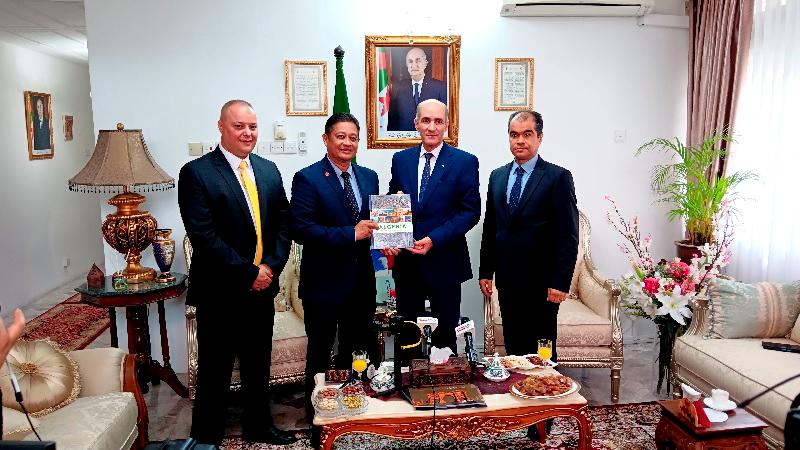THE Algerian ambassador to Malaysia Abdelhafid Bounour recently announced that efforts are underway to raise awareness among Malaysians about the various aspects of Algeria, showcasing his country’s many opportunities and strengths.
This is due to the fact that since his arrival in Malaysia over six months ago, Bounour has observed that Algeria is not well known in Malaysia.
In this regard, he underscored the importance of developing relations between Algeria and Malaysia in key areas such as trade, investment, tourism, education and culture.
During a meeting with local journalists held at his official residence in Kuala Lumpur, Bounour expressed a desire to strengthen ties between the two “brotherly countries” and explore new opportunities for co-operation.
He listed down some key highlights of Algeria and also emphasised various aspects of Algeria, highlighting its numerous potentials in all fields:
- Strategic geographic location: Algeria is the largest country in Africa and the Arab world, covering an area of 2,381,741 square kilometres and sharing borders with seven countries. “Algeria offers unique investment and partnership opportunities due to its strategic geographic location. Its proximity to Europe, at a short distance from European countries bordering the Mediterranean Sea such as Portugal, Spain, France and Italy, further enhances these prospects.”
- Natural and energy resources: “From oil and natural gas to minerals and rare materials, Algeria has long been perceived as a land of wealth. Algeria produces iron and steel, precious metals like gold and silver, industrial minerals including barite, bentonite, cement, crushed stone, gravel, gypsum, helium, limestone, marble, nitrogen fertilizers, phosphate, pozzolana, quartz, salt, and sand in various forms. It also has significant untapped mineral deposits, including diamond, manganese, crystalline quartz, rare earth minerals, tungsten, and uranium.
- The Sahara: Bounour said the world's largest hot desert gives Algeria advantages in the fields of renewable energy and desert tourism. “I invite Malaysian companies to explore these promising sectors.”
- Major natural gas exporter: “Algeria is the top provider of natural gas to Europe, supplying natural gas to the continent through two main entry points: the two Medgaz pipeline to Spain and the two TransMed pipeline, which transports gas to mainland Italy,” said Bounour.
- Diverse Climate: With its four seasons, Algeria boasts a variety of landscapes that allow for different climatic experiences and varied scenery, ranging from Mediterranean beaches to snow-covered mountains, forests, and vast desert expanses. This climatic diversity, said Bounour, offers investment opportunities in agriculture, tourism, and renewable energy.
- Dynamic population, rich culture: Bounour also said that Algeria's dynamic and diverse 48-million population constitutes an attractive market.
- Education, research: Algeria's universities, numbering over 100 with 1.6 million students, enjoy a strong reputation, he said, adding that opportunities for educational partnerships and research collaborations are being considered.
- Transportation infrastructure: “Algeria possesses modern transportation infrastructure, including the metro and tramway, paving the way for closer commercial partnerships between the two countries. Algeria plans to open a direct air route between Algiers and Kuala Lumpur in June 2024. Citizens of both countries are exempt from entry visas to each other's territories,” Biounour said, adding that more information on the air route to be revealed next year.
Other facts and figures on Algeria include:
- Maritime facade of 1,622 km, with 51 ports for commerce, hydrocarbons, fishing, and recreation.
- 51 airports, including 20 international ones. The largest is the Algiers airport with a capacity of over six million passengers per year. Air Algerie is the national airline.
- Railway network spanning 4,695 km covering the north and south of the country.
- Road network of 918,140 km, including 1,408 km of highways and 10,227 km of the trans-Saharan road in the south (African Unity Road), of which 3,766 are on Algerian territory. The “African Unity Road” traverses six countries – Algeria, Tunisia, Niger, Mali, Chad, and Nigeria.
Bounour, who also mentioned that “significant progress” has been made in the fields of health, education, and housing, contributing to the country's social achievements, also briefly explained some facts about Algeria’s public health system, education, housing programmes, social security, food subsidies, economy and the equal status for men and women.
The ambassador reaffirmed his commitment to intensify exchanges and strengthen co-operation between Algeria and Malaysia. He encouraged Malaysian companies to explore investment opportunities in Algeria and expressed confidence in “a fruitful future for bilateral relations”.
Bounour also advocated for strengthening cooperation in the tourism sector, encouraging the creation of specialised agencies or organisations to develop bilateral tourism. He concluded the meeting by saying that his objective is to enhance cooperation opportunities and promote cultural exchanges, thereby paving the way for exceptional tourism cooperation between the two countries.
Also present at the meeting was Malaysian Inbound Tourism Association president Uzaidi Udanis who looked forward to more tourism-related initiative by Algeria in Malaysia, such as a physical tourism “centre”, in the near future.
He stated that an Algerian tourism centre will be very useful to serve as a cultural bridge between the country and Malaysia, inviting Malaysians to explore the rich tapestry of Algerian culture, while at the same time promoting Malaysia to Algerians as a preferred tourist destination.
“With citizens of both Algeria and Malaysia enjoying visa-free travel, such the centre can be a conduit for meaningful people-to-people connections, fostering a spirit of friendship and mutual understanding.”









